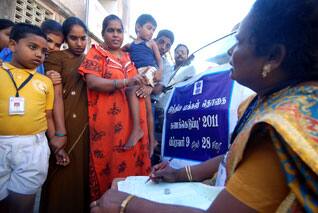பள்ளிகளில் குழந்தைகளுக்கு தரப்படும் உடல் ரீதியான தண்டனைகளை தடை செய்வது குறித்து, பல்வேறு கட்டளைகளை, அனைத்து மாநிலங்களுக்கும் தேசிய குழந்தைகள் உரிமை பாதுகாப்பு ஆணையம் பிறப்பித்துள்ளது.
"தமிழகத்தில் உள்ள அரசு மற்றும் தனியார் பள்ளிகளில் படித்து வரும் குழந்தைகளுக்கு, உடல் ரீதியான தண்டனை தரக்கூடாது' என, அரசு அறிவுறுத்தி வருகிறது. இருந்தாலும், ஆங்காங்கே பள்ளிகளில், குழந்தைகள் மீதான வன்முறை விஸ்வரூபம் எடுத்து வருகிறது. சமீபத்தில், மதுரையில் உள்ள பள்ளியில், குப்பையை சாப்பிட ஆசிரியர் வற்புறுத்திய சம்பவம், பரவலாக அதிர்ச்சியை ஏற்படுத்தியுள்ளது.
கடந்த 2000ம் ஆண்டு, சுப்ரீம் கோர்ட், பள்ளிக் குழந்தைகளுக்கான உடல் ரீதியான தண்டனைகளை தடை செய்தது. மேலும், குழந்தைகள் உடல் ரீதியான தண்டனைக்கு உட்படுத்தப்படாமல், பயமில்லாத, சுதந்திரமான சூழ்நிலையில் கல்வி வழங்க வேண்டும் எனவும் அறிவுறுத்தியுள்ளது.
கடந்த 2000ம் ஆண்டு, சுப்ரீம் கோர்ட், பள்ளிக் குழந்தைகளுக்கான உடல் ரீதியான தண்டனைகளை தடை செய்தது. மேலும், குழந்தைகள் உடல் ரீதியான தண்டனைக்கு உட்படுத்தப்படாமல், பயமில்லாத, சுதந்திரமான சூழ்நிலையில் கல்வி வழங்க வேண்டும் எனவும் அறிவுறுத்தியுள்ளது.
ஆனாலும், நாளுக்கு நாள் அதிகரித்து வரும் தனியார் பள்ளிகளில், ஒழுக்கத்தை கடைபிடிக்க, உடல்ரீதியான தண்டனையை பயன்படுத்துகின்றனர். குழந்தைகளும், பயத்தின் காரணமாக, இந்த வன்முறையை அடிபணிந்து ஏற்றுக் கொள்கின்றனர்.தண்டனை அதிகரித்து, பிரச்னை விஸ்வரூபமெடுக்கும் போது மட்டுமே, அவை வெளிவருகின்றன.
சிறு சிறு தண்டனைகளே, பிற்காலத்தில் பெரும் குற்றத்துக்கு வித்தாக அமைவதை அவர்கள் உணர்வதில்லை. அதை கருதி, குழந்தைகளுக்கு ஏற்படும் வன்முறையை தடுக்கவும், அவர்களின் உரிமையை பாதுகாக்கவும், தேசிய குழந்தைகள் உரிமை பாதுகாப்பு ஆணையம் உருவாக்கப்பட்டுள்ளது. இவ்வாணையம், அனைத்து மாநிலங்களிலும் கல்வித்துறையில் பின்பற்ற வேண்டிய புதிய வழிகாட்டுதல்களை வழங்கியுள்ளது.
குறிப்பாக, பள்ளிகளில் நடைமுறைப்படுத்த வேண்டிய விதிமுறைகள் குறித்து கூறியிருப்பதாவது:
சிறு சிறு தண்டனைகளே, பிற்காலத்தில் பெரும் குற்றத்துக்கு வித்தாக அமைவதை அவர்கள் உணர்வதில்லை. அதை கருதி, குழந்தைகளுக்கு ஏற்படும் வன்முறையை தடுக்கவும், அவர்களின் உரிமையை பாதுகாக்கவும், தேசிய குழந்தைகள் உரிமை பாதுகாப்பு ஆணையம் உருவாக்கப்பட்டுள்ளது. இவ்வாணையம், அனைத்து மாநிலங்களிலும் கல்வித்துறையில் பின்பற்ற வேண்டிய புதிய வழிகாட்டுதல்களை வழங்கியுள்ளது.
குறிப்பாக, பள்ளிகளில் நடைமுறைப்படுத்த வேண்டிய விதிமுறைகள் குறித்து கூறியிருப்பதாவது:
பள்ளி மாணவ, மாணவியருக்கு, கை மற்றும் கால் முட்டிகளில் அடித்தல், பள்ளி மைதானத்தை சுற்றி ஓடச் செய்தல், பல மணி நேரத்துக்கு முழங்கால் இடச்செய்தல், பல மணி நேரம் சேர்ந்தார் போல்உட்கார செய்தல், பிரம்பால் அடித்தல், கிள்ளுதல், அறைதல், பாலியல் வன்முறை, தனி அறையில் பூட்டி வைத்தல், மின்சார அதிர்ச்சி மற்றும் அவமானப்படுத்துதல், உடல் மற்றும் மன ரீதியான பாதிப்புகளை ஏற்படுத்துதல் உள்ளிட்ட உடல் ரீதியான தண்டனைகள் கண்டிப்பாக தடை செய்யப்பட வேண்டும்.
பிரசாரம் மற்றும் விளம்பரங்களின் மூலம் குழந்தைகளுக்கு, அவர்களின் உரிமையை பற்றி தெரிவிக்க வேண்டும். அவர்கள் மீது இழைக்கப்பட்டுள்ள கொடுமைகளை எடுத்துக் கூறி, நம்பிக்கை அளிக்க வேண்டும். உடல் ரீதியான தண்டனைகளை எப்போதும் நடக்கக் கூடிய ஒரு சாதாரண செயலாக எண்ணிவிடக் கூடாது.ஒவ்வொரு பள்ளியிலும் விடுதிகள், காப்பகம் ஆகியவற்றில், குழந்தைகள் தங்களது குறைகளையும், கோரிக்கைகளையும் சொல்லும்படியான ஒரு குழு அமைக்க வேண்டும். ஒவ்வொரு பள்ளியிலும், குழந்தைகள் புகார்களை தெரிவிக்க, ஒரு புகார் பெட்டி அமைத்தல் வேண்டும்.
மாதாமாதம் பெற்றோர் ஆசிரியர் சங்கம் அல்லது பள்ளி மேலாண்மைக் குழு, பள்ளி மற்றும் நிர்வாகக் குழு குழந்தைகளின் புகார்களை பரிசீலித்து, நடவடிக்கை எடுக்க வேண்டும். குழந்தைகள் செய்த புகார் அடிப்படையில், பெற்றோர் ஆசிரியர் சங்கம் உடனடியாக நடவடிக்கை எடுக்க வேண்டும். மேலும், பிரச்னைகளை ஒத்தி வைத்தல் கூடாது.பெற்றோர் மற்றும் குழந்தைகளுக்கு இத்தகைய அநீதிகளை எதிர்த்து குரல் எழுப்புவதற்கு, உரிமை அளித்தல் வேண்டும். ஏனெனில், இவை குழந்தைகள் மத்தியில் ஒரு எதிர்மறையான தாக்கத்தை ஏற்படுத்துகின்றன.
உள்ளாட்சி, மாவட்டம் மற்றும் மாநில அளவில் செயல்படும் கல்வித் துறைகள், குழந்தைகளின் புகார்களை பரிசீலனை செய்யவும், கண்காணிக்கவும், ஒரு தெளிவான வழிமுறைகளை வரையறுக்க வேண்டும்.இவ்வாறு அதில் கூறப்பட்டுள்ளது.பள்ளிகளுக்கு வழங்கப்பட்டுள்ள வழிமுறைகளை பின்பற்றி, மாநில அரசு எடுத்த நடவடிக்கைகளை, இரண்டு மாதத்துக்குள் சமர்ப்பிக்க ஆணையம் உத்தரவிட்டுள்ளது.
பிரசாரம் மற்றும் விளம்பரங்களின் மூலம் குழந்தைகளுக்கு, அவர்களின் உரிமையை பற்றி தெரிவிக்க வேண்டும். அவர்கள் மீது இழைக்கப்பட்டுள்ள கொடுமைகளை எடுத்துக் கூறி, நம்பிக்கை அளிக்க வேண்டும். உடல் ரீதியான தண்டனைகளை எப்போதும் நடக்கக் கூடிய ஒரு சாதாரண செயலாக எண்ணிவிடக் கூடாது.ஒவ்வொரு பள்ளியிலும் விடுதிகள், காப்பகம் ஆகியவற்றில், குழந்தைகள் தங்களது குறைகளையும், கோரிக்கைகளையும் சொல்லும்படியான ஒரு குழு அமைக்க வேண்டும். ஒவ்வொரு பள்ளியிலும், குழந்தைகள் புகார்களை தெரிவிக்க, ஒரு புகார் பெட்டி அமைத்தல் வேண்டும்.
மாதாமாதம் பெற்றோர் ஆசிரியர் சங்கம் அல்லது பள்ளி மேலாண்மைக் குழு, பள்ளி மற்றும் நிர்வாகக் குழு குழந்தைகளின் புகார்களை பரிசீலித்து, நடவடிக்கை எடுக்க வேண்டும். குழந்தைகள் செய்த புகார் அடிப்படையில், பெற்றோர் ஆசிரியர் சங்கம் உடனடியாக நடவடிக்கை எடுக்க வேண்டும். மேலும், பிரச்னைகளை ஒத்தி வைத்தல் கூடாது.பெற்றோர் மற்றும் குழந்தைகளுக்கு இத்தகைய அநீதிகளை எதிர்த்து குரல் எழுப்புவதற்கு, உரிமை அளித்தல் வேண்டும். ஏனெனில், இவை குழந்தைகள் மத்தியில் ஒரு எதிர்மறையான தாக்கத்தை ஏற்படுத்துகின்றன.
உள்ளாட்சி, மாவட்டம் மற்றும் மாநில அளவில் செயல்படும் கல்வித் துறைகள், குழந்தைகளின் புகார்களை பரிசீலனை செய்யவும், கண்காணிக்கவும், ஒரு தெளிவான வழிமுறைகளை வரையறுக்க வேண்டும்.இவ்வாறு அதில் கூறப்பட்டுள்ளது.பள்ளிகளுக்கு வழங்கப்பட்டுள்ள வழிமுறைகளை பின்பற்றி, மாநில அரசு எடுத்த நடவடிக்கைகளை, இரண்டு மாதத்துக்குள் சமர்ப்பிக்க ஆணையம் உத்தரவிட்டுள்ளது.
நன்றி:








